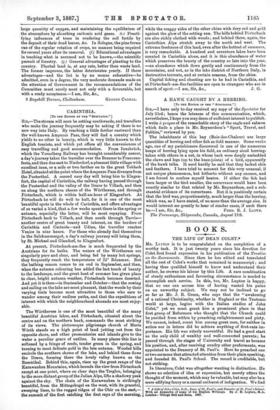CARINTHIA.
[TO THE EDITOR 07 THE .SPECTATOIL.”3
SIR,—The stream will soon be setting southwards, and travellers who make the journey frequently may be asking if there is no new way into Italy. By reaching a little farther eastward than the well-known Ampezzo Pass, they will find a country which yields to no other in beauty, which is very little known to the English tourists, and which yet offers all the conveniences of easy travelling and good accommodation. From Innsbruck, which the Vorarlberg Railway has brought considerably nearer, a day's journey takes the traveller over the Brenner to Franzens- festa, and then due east to Niederdorf, a pleasant little village with excellent inns, or a mile or two farther on to the great Toblach Hotel, situated at the point where the Am pezzo Pass diverges from the Pasterthal. A second easy day will bring him to Klagen- furt, the capital of Carinthia, the railway having passed through the Pasterthal and the valley of the Drove to Viliach, and then on along the northern shores of the Worthersee, and through Portschach, which is within half-au-hour of Klagenfurt. At Portachach he will do well to halt, for it is one of the most beautiful spots in the whole of Carinthia, and offers advantages of so varied a kind, that a few weeks spent there in the spring or autumn, especially the latter, will be most repaying. From Portschach back to Villach, and then south through Tarvis- another centre of great beauty and interest, on the borders of Carinthia and Carinola—and Udine, the traveller reaches Venice in nine hours. For those who already find themselves in the Salzkammergut, a day's railway journey will bring them, by St. Michael and Glandorf, to Ktagenf art.
At present, Portschach-am-See is much frequented by the Austrians for its baths. The waters of the WOrthersee are singularly pure and clear, and being fed by many hot springs, they frequently reach the temperature of 22° Reanmur. But the bathing season comes to an end in September, and then, when the autumn colouring has added the last touch of beauty to the landscape, and the great heat of summer has given place to clear, bright autumn weather, Portschach becomes deserted. And yet it is then—in September and October—that the rowing and sailing on the lake are most pleasant, that the woods by their varying tints become most attractive to those who care to wander among their endless paths, and that the expeditions of interest with which the neighbourhood abounds are most enjoy- able.
The Worthersee is one of the most beautiful of the many beautiful Austrian lakes, and POrtachach, situated about the centre and on the northern bank, commands the most striking of its views. The picturesque pilgrimage church of Maria Worth stands on a high point of land jutting out from the opposite shore, and other promontories and islands give to the water a peculiar grace of outline. In many places this line is softened by a fringe of reeds, tender green in the spring, and turning to most delicate gold in the late autumn. Wooded hills encircle the southern shores of the lake, and behind these flows the Brave, forming there the lovely valley known as the Rosenthal. Behind this, again, rises up the great range of the Karawanken Mountains, which bounds the view from Portschach except at one point, where on clear days the Terglou, belonging to the more distant group of the Jnlian Alps, lifts a shadowy peak against the sky. The chain of the Karawanken is strikingly beautiful, from the Mittagskogel on the west, with its graceful, sweeping lines, to the rugged ridges of the Obir on the east,— the summit of the first catching the first rays of the morning, while the craggy sides of the other shine with fiery red and gold against the glow of the setting sun. The hills behind Portschach are also richly clothed with woods ; and behind these, again, the Carinthian Alps stretch away to the north and west. The extreme freshness of this land, even after the hottest of summers, is very remarkable. A hundred and seventeen lakes have been counted in Carinthia alone, and it is this abundance of water which preserves the beauty of the country so late into the year, —an abundance which flows gently and continuously from the mountains, and not, as in the lake district of Northern Italy, in destructive torrents, and at certain seasons, from the skies.
Capital fishing and shooting are to be had in Carinthia, and at Portscliach -am-See facilities are open to strangers who are in search of spert.—I am, Sir, &o., J. G.


































 Previous page
Previous page